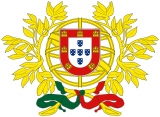Council of Ministers (Portugal)
 |
|---|
| Constitution |
|
The Council of Ministers (Portuguese: Conselho de Ministros, pronounced [kõˈseʎu dɨ miˈniʃtɾuʃ] or [kõˈsɐʎu dɨ mɨˈniʃtɾuʃ]) is a collegial executive body within the Government of Portugal. It is presided over by the Prime Minister, but the President of Portugal can take on this role at the Prime Minister's request. All senior ministers are members of the Council of Ministers, and when the prime minister finds it applicable, state secretaries can also attend its meetings.
Functions[]
The Council of Ministers discusses and approves bills to be submitted to the Assembly of the Republic and decrees and resolutions.
Current Council of Ministers[]
As of 17 October 2021, the Council of Ministers consists of the following:[1]
| Party key | Socialist Party | |
|---|---|---|
| Independent |
| Ministry | Incumbent | Term | ||
|---|---|---|---|---|
| Prime Minister | António Costa | 26 November 2015 – present | ||
| Minister of State | Economy and Digital Transition | Pedro Siza Vieira | 15 October 2018 – present | |
| Foreign Affairs | Augusto Santos Silva | 26 November 2015 – present | ||
| Premiership | Mariana Vieira da Silva | 18 February 2019 – present | ||
| Finance | João Leão | 15 June 2020 – present | ||
| National Defence | João Gomes Cravinho | 15 October 2018 – present | ||
| Internal Administration | Eduardo Cabrita | 21 October 2017 – present | ||
| Justice | Francisca Van Dunem | 26 November 2015 – present | ||
| Modernisation of the State and Public Administration | Alexandra Leitão | 26 October 2019 – present | ||
| Planning | Nelson de Souza | 18 February 2019 – present | ||
| Culture | Graça Fonseca | 15 October 2018 – present | ||
| Science, Technology and Higher Education | Manuel Heitor | 26 November 2015 – present | ||
| Education | Tiago Brandão Rodrigues | 26 November 2015 – present | ||
| Labour, Solidarity, and Social Security | Ana Mendes Godinho | 26 October 2019 – present | ||
| Health | Marta Temido | 15 October 2018 – present | ||
| Environment and Climate Action | João Pedro Matos Fernandes | 26 November 2015 – present | ||
| Infrastructure and Housing | Pedro Nuno Santos | 18 February 2019 – present | ||
| Territorial Cohesion | Ana Abrunhosa | 26 October 2019 – present | ||
| Agriculture | Maria do Céu Antunes | 26 October 2019 – present | ||
| Sea | Ricardo Serrão Santos | 26 October 2019 – present | ||
The following are also attending the meetings of the Council of Ministers, but without voting rights:
- Secretary of State for Parliamentary Affairs - Duarte Cordeiro;
- Secretary of State for the Presidency of the Council of Ministers - André Moz Caldas.
Presidency of the Council of Ministers[]
The Presidency of the Council of Ministers is the central department of the Government of Portugal whose mission is to provide support to the Council of Ministers, the Prime Minister and the other members of the Government organically integrated there and promote inter-ministerial coordination of the various government departments.
In accordance with the Organic Law of the XXII Constitutional Government, the Presidency of the Council of Ministers comprises the following members of the Government:[2]
- Prime Minister
- Secretary of State for Parliamentary Affairs
- Secretary of State Adjunct to the Prime Minister
- Minister of State and of the Premiership
- Secretary of State of the Presidency of the Council of Ministers
- Secretary of State for Citizenship and Equality
- Secretary of State for Integration and Migrations
The Presidency of the Council of Ministers also provides support to the dependent services of the Prime Minister, as well as those of the Minister for the Modernisation of State and Public Administration, Minister of Planning, Minister of Culture, Minister of Infrastructure and Housing, and the Minister of Territorial Cohesion.[2]
See also[]
References[]
- ^ "Governo de Portugal". www.portugal.gov.pt. Retrieved 2021-10-17.
- ^ a b "Lei Orgânica do Governo: Decreto-Lei n.º 169-B/2019 de 3 de Dezembro". portugal.gov.pt (in Portuguese). Government of Portugal. Retrieved 2 May 2020.
External links[]
- Government of Portugal
- National cabinets
- Politics of Portugal
- Government stubs